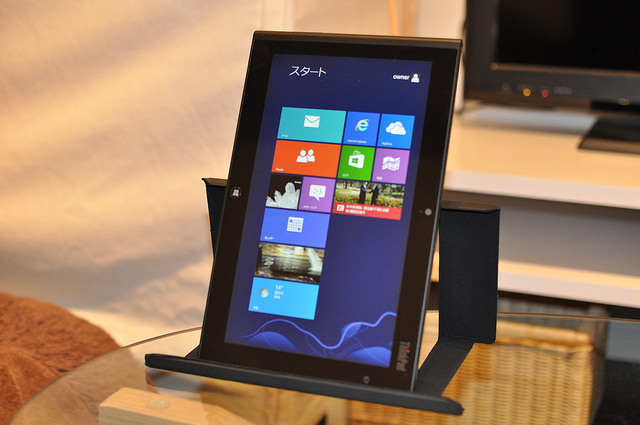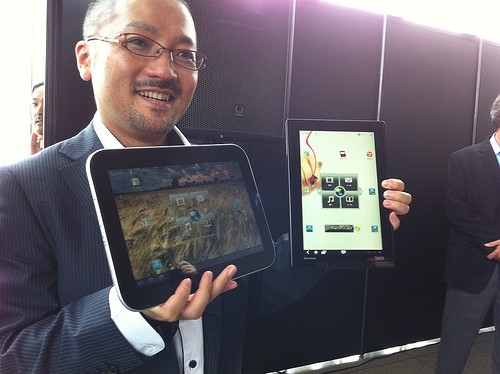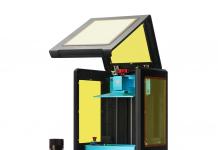Last year, 14.1 million tech lovers in the United Kingdom used a tablet at least once a month. This year, eMarketer believes nearly 20 million UK residents will regularly get their hands on a tablet, 39 percent more than in 2012. So why are so many choosing tablets over traditional laptops and desktop computers? Read on to discover eight key advantages of tablet computers.
Image via Flickr by Masaru Kamikura
Their Batteries Last Longer
Both laptops and tablets are designed to work anywhere, but tablets do it better. While their batteries aren’t as big and bulky as those contained in laptops, they punch well above their weight. A tablet’s hardware doesn’t require a lot of power, so one can happily run for up to ten hours without charging. Compare that to the average laptop, which only lasts between three to four hours. Even if you opt for a high-end laptop, you’ll only get eight hours before your computer needs juice. You’ll be thankful for the extra hours a tablet provides next time you’re on a long-haul flight, taking business meetings all day, or stuck without power.
They’re Affordable
Leading computer brands have embraced the new technology, releasing a range of tablets to suit all budgets. With so many on the market by mid-2012 the average price of a tablet computer had fallen to £250. A midrange laptop will set you back between £300 and £500. A basic home desktop should cost around £300, but if you hope to use it for gaming and high-definition videos prepare to spend at least £800. A good tablet costs about the same as a low to mid-range laptop or desktop computer, so you’ll get more bang for your buck.
The cost of computers is about more than the initial outlay though. Tablets are less prone to viruses and malware than traditional computers, so they cost less to support. Just think what else you could spend the average £25 an annual anti-virus subscription costs on, and how much those fees will add up over your device’s lifetime.
You’ll also find tablet software much more affordable. Online marketplaces are flooded with tablet apps that are free or close to it, so it doesn’t cost a lot to stay entertained. However, if you want a new game for your laptop or desktop computer, you’ll spend an average of £24.32.
They’re Ergonomic
More than half a million Brits suffer from repetitive strain injury (RSI), a condition strongly linked to traditional computer use. The muscle, tendon, and nerve pains it causes are so bad that six people in the United Kingdom quit their jobs every day to alleviate their RSI symptoms. Perhaps they should simply trade in their desktop and laptop computers for tablet models!
Tablets are made to fit comfortably in your hand, so you can use them while relaxing in a chair rather than hunching over a keyboard. Their touch screens also replace the classic computer mouse, which requires the repetitive scrolling and clicking often blamed for some RSI symptoms.
They’re Easily Portable
When laptops hit the market, they were celebrated for their portability. However tablets take this concept to the next level. Laptops have screens measuring at least 13 inches, and they typically weigh almost three kilos. Compare that to a modern Lenovo Tablet PC like the Thinkpad Tablet 2 series. Its screens are a much tidier 10.1 inches, and the bulkiest model is still ultra-light at 600 grams. While laptops require bulky custom-built bags, you can easily stash a tablet inside your everyday tote.
That easy portability makes tablets perfect for students wanting to take notes and access course material in class, businesspeople who take meetings away from the office, and families that need entertainment on the move.
They Recognise Handwriting
Tablet computers use a technology known as digital ink which allows you to create and store handwritten notes, diagrams, artworks, and more. This allows tablet owners to do away with their notepads and pens, and the stress that comes when you lose a vital piece of paper. The feature also allows you to easily add your own signature to business correspondence.
A tablet stylus feels a lot like a traditional pen, so users find they can easily use the technology. It’s a very natural process, unlike drawing with a regular computer mouse.
A tablet can even recognise your handwriting and convert it to typed text. That functionality’s perfect for anyone who’s still using the “hunt and peck” typing method. With a tablet, your typing style won’t slow you down next time you’re preparing a business report or academic essay.
They’re Easy to Navigate
Anyone who’s ever attempted to teach an elderly relative how to use a desktop computer will realise how difficult a keyboard and mouse can be to master. While anyone familiar with computers takes these devices for granted, managing them can slow novices down. In contrast, tablets are much more intuitive. Users can use the touchscreen or a stylus to navigate quickly and easily.
They’re Flat
A tablet’s flat design doesn’t sound like a real advantage until you begin using it. This design helps you easily work on a tablet on any surface. It also makes the tablet perfect for business presentations or simply showing your best friend your travel snaps over lunch.
A laptop can seem like a dividing wall at times, separating you from the rest of the world. It’s much easier to communicate with your new client or business partner when you can lay a tablet flat to take notes about your meeting.
They Work in Landscape or Portrait Modes
A tablet works in landscape or portrait modes, or horizontally and vertically if you prefer. This extra functionality gives them an edge over laptops and desktop computers, which have displays fixed in landscape mode.
Portrait mode feels most natural when reading ebooks, as it replicates the physical books they’re made to resemble. It’s also the best for mode for viewing photographs originally snapped in portrait mode. Being able to tilt and shift between different orientations is another of tablet technology’s great strengths.
With so many important advantages, it’s easy to see why forecasters predict more than 52 percent of the UK population and around two-thirds of local internet uses will have access to tablet computers by 2017.












